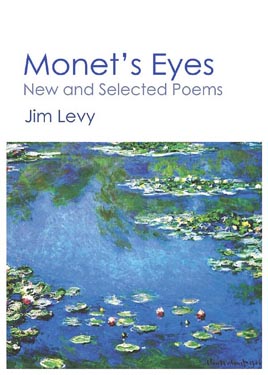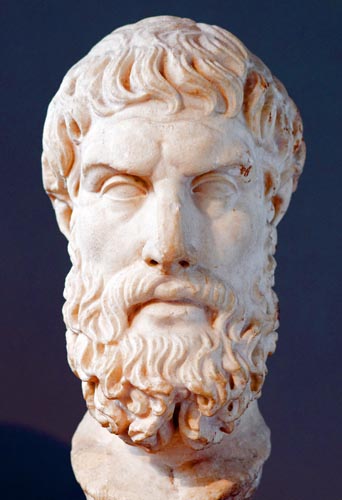Elation, a Plea
by Jim Levy

From Monet's Eyes, New and Selected Poems by Jim Levy
© Copyright 2018 Jim Levy, All Rights Reserved.
Please direct enquiries for commercial re-use to jimlevy40@gmail.com.
Epicurus' philosophy according to Diogenes of Oenoanda: a poem
In the second century A.D., Diogenes of Oenoanda, nearing the end of his life, carved a paean to the philosophy of Epicurus on the wall of a portico in the Greek city of Oenoanda in southern Turkey. Having completed it, he wrote a friend giving a summary of his message.
Dear Antipater,
I write to tell you of the wall I’ve built
and the words I have inscribed on it,
that put before the world the wise thoughts
of Epicurus, who saw things as they are
and taught us how to live a happy life
of virtue, free of fear.
I speak of atoms, how they are all
and everywhere in motion,
more primal than the air or fire,
more original than earth or water.
Atoms while falling through the void
into the void, swerve and crash
into each other, and that blow
shocks them into life. They form
bees, stars, frogs in ponds,
the crocus and the tulip
and ourselves and even gods.
I explain that pleasure is the goal in life.
I take that as my starting point.
By that, I mean, not the search
for wealth or power, the luxuries
and prizes most men seek,
not even honor, which is a word
that has no substance.
Gnawing at the bone of gold and status
only ends by serving institutions,
openly or secretly. Take pleasure
from a modest meal of simple food,
a loving friend, a good night’s sleep,
a wife if need be, and the pleasures
of the mind, reading, writing and creating art.
Study art and nature, but not philosophies
that trick the intellect with sophistry
and dialectic. Use your senses and your mind
to wonder and to understand the world
and how it works. Such knowledge leads
to true tranquility.
Fear the bear and scorpion
but not the teeth of time,
the stings of pain or death
or an afterlife of torment.
Pain is natural. If short,
endure it. If intense,
think of joyful times.
If prolonged, it will probably
end in death.
Fear of death runs rampant
among men, like plague
that spreads from sheep to sheep
but there are sudden deaths
while planting radishes
or soaking in a bath. Even better,
to die while sleeping, unaware
of uncollected debts and words unwritten.
Fear not. The body dies
but the soul – the soul dies too.
Epicurus said as much in simple language.
Soul is body, body soul,
at death they die together.
Being dead is nothing. Once dissolved,
we are not, for what we were before,
we are again. That’s the good news.
There is no other.
The dead don’t rise from dirt
and wander through the town.
There’s no underworld of river,
boatman, dog, or heaven overhead
or hell of fire. These are fables,
lies fed to us by priests to dupe
the wicked and the pious both.
There’s no punishment for bad behavior
or rewards for daily prayers.
Religion is a fiction, to comfort
or to frighten us. It is cruel, setting men
to torture men with whips and tongs,
like the girl at Aulis who cried “father”
but to no avail. She was a sacrifice to Artemis
so that some ships could sail.
The gods exist but not like Homer’s vengeful
fornicators. There’s no Vulcan lame,
Athena in long dress, Neptune with green eyes.
The gods live in a vacuum
deaf to prayers, blind to what we do.
They are absentminded beings
who enjoy themselves indifferent
to our foibles and our fates.
Live without approval of the crowd
or illicit loves or slaves or perfumes
from the East. Live with moderation,
freely, in a state of lucid understanding
and acceptance. Enjoy your life
but do no harm to others or yourself.
Practice virtue for itself
and not for some reward.
In fact, practice happiness,
and you will find it is
its own reward.
Please accept this letter as a gentle plea
to study Epicurus and his words,
for they are all you need
to live a happy life and die
a peaceful death.
Notes:
on the wall. The wall measured eight feet high by 260 feet long and was probably built between the years 117-138 A.D. It consisted of roughly 25,000 words, of which about 6,000 have been found and restored.
Dear Antipater Antipater and the letter are fiction.
all you need to live a happy life and die a peaceful death.
Epicureanism was defamed by Platonists and Stoics who saw it as a threat to their ideas. One of the words for heretic in the Talmudic literature is Apiqoros (Epicurus) and in the Mishnah, apiqorsim (Epicureans) are among the people who do not have a share in the World To Come. In Canto X of Dante’s Inferno, Epicureans are depicted as heretics suffering in the sixth circle of hell.
Also See:
The Teachings of Epicurus, by M. J. Mattes
An original essay on the teachings of the Hellenistic philosopher Epicurus who applied rational, analytical thinking to practical philosophical questions. Epicureanism is older than Christianity by hundreds of years, and comparable in age to all of the major religions. Epicurus concluded that there is no afterlife of the human spirit (after the death of the body), and that there are no gods that control human affairs. He recognized that nature operates by consistent mechanisms, even though he did not understand what most of the mechanisms were, and that there were no miracles. In short, the concept of atheism is not new, but has an ancient and distinguished history.
